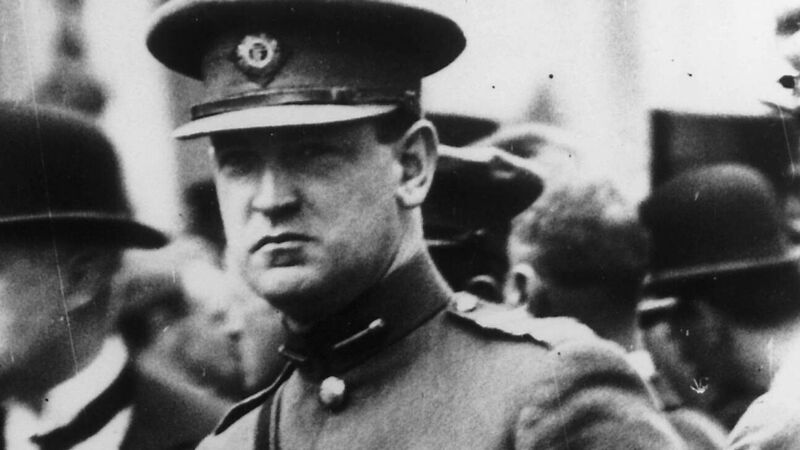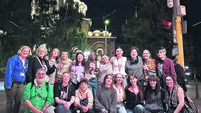Here’s why Collins will always be the greatest ever Irishman

Dr Siobhan Doyle of TU Dublin expressed the opinion recently that we should “not allow sentiment to overpower accuracy” - the tendency to, as a friend of mine once said, “never leave history get in the way of a good yarn”!
Different standpoints no doubt and each can easily be understood.
A century after his death, with dozens of books, songs, poems and article written about him, the Man from Woodfield still provokes more debate and discussion than arguably any other Irishman.
Plenty politicians since 1922 have had the opportunity Collins never got, but are we any closer to a united Ireland today than on August 22, 1922?
Even allowing for Dr Doyle’s fear of sentiment clouding facts, there is no disputing the greatness of Michael Collins - brilliance is probably a more suitable description of a man shot down seven weeks before his 32nd birthday.
Down the years and across the world, we have seen freedom-fighters achieve their aims at overthrowing foreign tyranny and then, maybe over a decade or so, morph into statesmen. The amazing and remarkable thing about Collins was that he successfully made that transition in just a few short years.
The farmer’s son from West Cork followed the well-trod emigration path to London like so many others from his native place. Passing the ‘Post Office exams’ was no dawdle, and even from an early age Michael showed acumen and skill in matters financial - experiences that would serve him well as Minister for Finance and in masterminding the National Loan.
Working in the Post Office in London, he got imbued with the ‘cause’ of Irish Freedom from so many other Irishmen and women then employed in the city. One of these, Sam Maguire of Dunmanway - only about 14 miles separates their birthplaces - was hugely influential on the young Collins. Maguire was 13 years older and an outstanding player with the Hibernians and London Gaelic Football teams.
The West Cork neighbours became great friends and, as IRB members worked tirelessly in reviving the dashed hopes of 1798, 1803, 1847 and 1867.
I use the word brilliant to describe Collins, and I don’t do so hesitantly or with any reservations. No, show me any other person in Irish history since Cú Chulainn was a boy that made a bigger contribution to Ireland getting its place among the nations of the world.
Where did he learn about military tactics, guerilla warfare and avoiding pitched battles when the numbers are against you? We know he read voraciously and had more than the average quotient of common sense. He was astutely and acutely aware during the War of Independence that the Irish Republican Army could never beat the might of the British Empire’s military forces on an open battlefield. He knew the numbers game well and drew up fighting strategies in accordance with the fighting force available to him.
Personally, I would never forgive Éamon de Valera for not leading the negotiations with England. He was a self-professed ‘statesman’, Collins a fighter and organiser of fighting men. de Valera had been to America, been pictured on newspapers the world over and on Pathe Newsreel films - he was a well-recognised figure.
In July, 1921, Collins, despite a £10,000 bounty on his head, was an ‘unknown quantity’ to the British, like a Scarlet Pimpernel in Dublin. When any war ends and talks begin to try and broker a permanent peace, compromise comes into play. de Valera knew full well the Irish wouldn’t get all they wanted, but he was not going to take the blame or criticism. Why didn’t Collins refuse to go to London? Well, I think he was truly a man of honesty and principle - when asked to do a task, he took it on despite his reservations. That was Collins to the very core - always putting Ireland before himself.
You know, growing up in the 1960s, we heard precious little in school about Collins and his outstanding contribution to Irish freedom. Maybe because the ‘Troubles’ were starting in the North so talk of Collins and the IRA might not have been politically correct at the time.
No-one in my family had any hard and fast opinions on politics, good, bad or indifferent, so I had to read and research, ask questions and look for information on ‘The Big Fellow’. One way or another, I have been fascinated over the years by the way he took on every job given to him with relish and zeal.
Setting up the apparatus of an independent State after 1919 - though still not recognised in London - took organisational ability and in this the man from Woodfield excelled. He loved democracy and the concept of a democratically elected Government but was also realistic enough to accept the path to freedom was a rocky one and oft times strewn with bullets, grenades and bombs.
His passionate words during the Treaty debates - “it gives us freedom, not the ultimate freedom that all nations desire but the freedom to achieve it” - were a perfect summary of what he and the other plenipotentiaries had signed.
His vision of the future of his country was way ahead of what others had in mind. He recognised our problems, with a huge swathe of Ulster people proclaiming allegiance to the British crown, but felt such obstacles were not unsurmountable.
He had an outstanding mind, the gift of eloquence, an unquenchable spirit and yearning for Irish freedom. The greatest tribute payable to the greatest ever Irishman is that we never forget his legacy and his selfless sacrifices for Ireland.
Just a century ago, his was the ultimate sacrifice as his blood flowed on the roadside at Beal na Blath, in his own beloved Cork. I am certain that in another century the name of Michael Collins will still be venerated and remembered in his native land and in every country that ever strove to win freedom for its people.







 App?
App?




